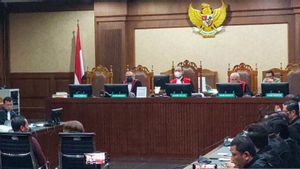JAKARTA - Property developer, PT Intiland Development Tbk hopes that the government can provide support for the development of the national property sector. One of the factors that are expected to be a catalyst for growth is by issuing regulations that can simplify and simplify the licensing process or the Omnibus Law.
"We hope that the Omnibus Law can have a positive impact on the growth of the property industry in general and the company's business," said Archied Noto Pradono, Director of Capital Management and Investment at PT Intiland Development Tbk, in a statement received by VOI, Tuesday, January 7.
He explained, Intiland projects that this year's property market conditions will not change significantly. However, his party continues to strive to maintain and improve sales performance this year by relying on sales from current projects and the launch of several new projects.
"We are targeting the marketing sales contributor in 2020 to come from the launch of new projects, such as the Pinang Apartemen in October 2020," said Archied.
He added that in addition to focusing on developing residential projects, the company this year is also expanding in the industrial estate development segment.
“In 2020, the company plans to start a development area for the first phase of a new industrial estate project located in Central Java with a total area of 287 hectares and a new development area at Ngoro Industrial Park, Mojokerto, East Java. The prospect of developing industrial estates in Indonesia is very good. This new industrial estate development project has very positive potential, because of its strategic location, close to toll roads and power plants, and supported by more competitive labor wages, ”explained Archied.
Responding to the business plan above, he continued, the company allocated a capital expenditure (capex) this year of IDR 1.5 trillion.
"The capex allocation will be used to finance ongoing construction and development of new projects," explained Archied.
Previously, Real Estate Indonesia (REI) hoped that the Omnibus Law could have a positive impact on the performance of the property sector in 2020. Chairman of the Central Executive Board of the Indonesian Real Estate Companies Association (DPP REI) Paulus Totok Lusida welcomed the government's efforts to cut regulations deemed still hindering the investment climate in the property sector.
"The growth of the property industry in 2020 will depend on the Omnibus Law because currently there are still many regulations that make people afraid to invest due to uncertain regulations and licensing processes," said Totok some time ago.
Furthermore, he revealed that REI had also provided some input to the government regarding regulations that needed to be changed because they were considered to be obstacles for the property industry.
Several regulations that are proposed to be amended include, among others, the Minister of Public Works and Housing Regulation No. 23/2018 concerning the Association of Apartment Owners and Occupants (P3SRS) and PUPR Regulation No. 11/2019 concerning the Preliminary Sale and Purchase Agreement System (PPJB).
"Apart from these regulations, we have submitted input regarding other regulations which are considered to be still hampering the growth of the property industry," he said.
Totok said that in 2020 the property industry will still be faced with quite tough challenges due to the threat of the global economy and the slowdown in national economic growth.
The English, Chinese, Japanese, Arabic, and French versions are automatically generated by the AI. So there may still be inaccuracies in translating, please always see Indonesian as our main language. (system supported by DigitalSiber.id)













